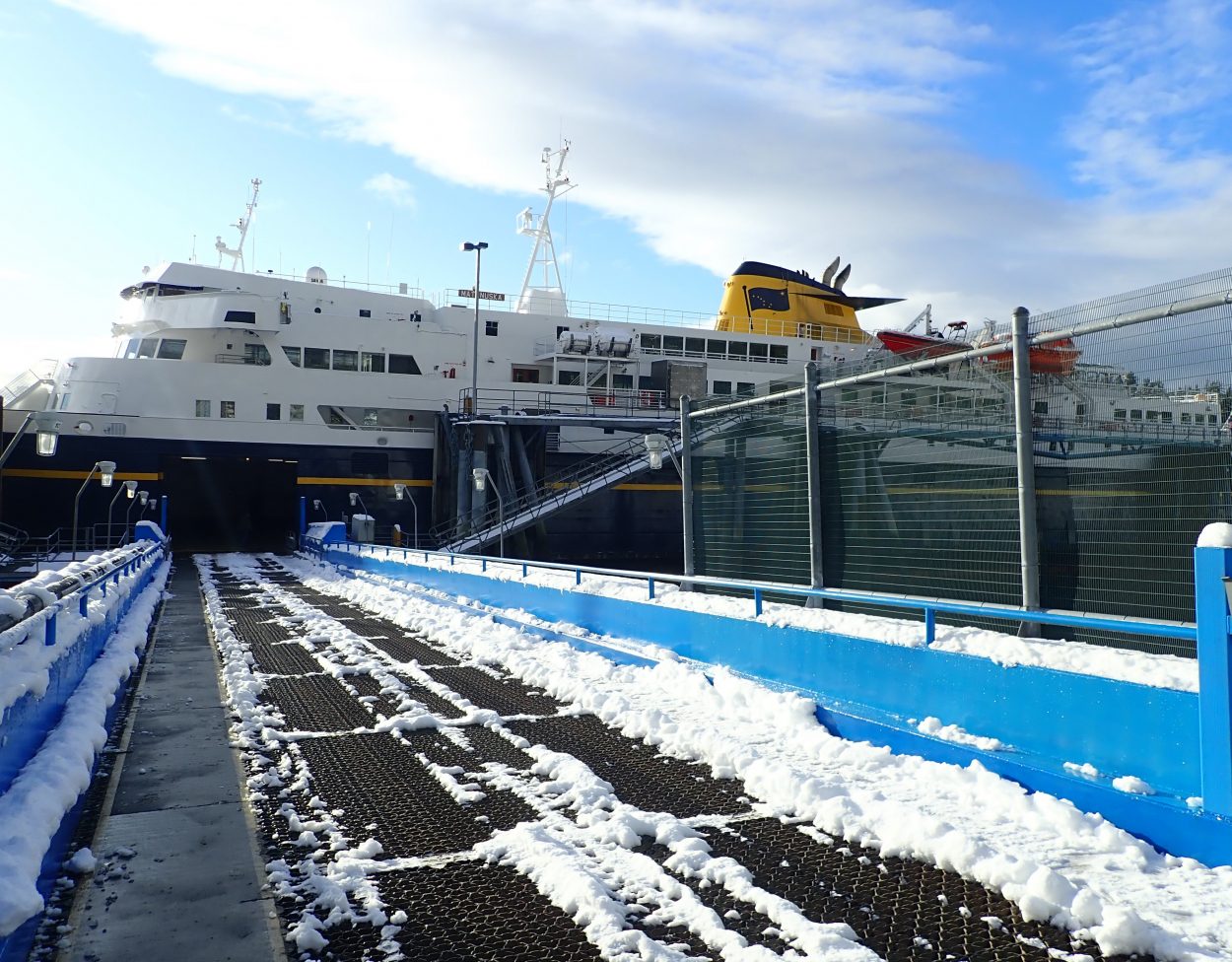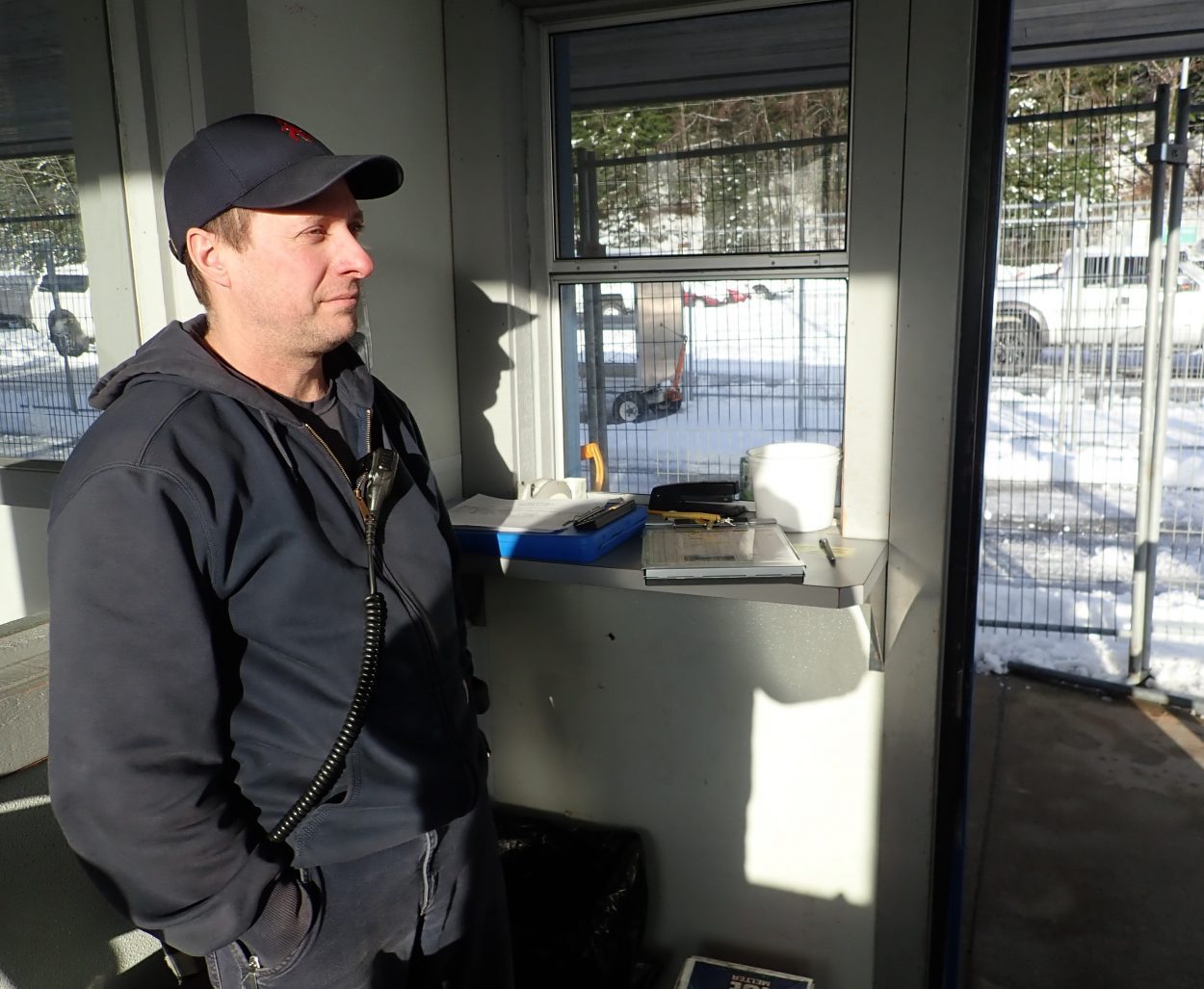
When the last of the Alaska Marine Highway System mainliners broke down in Juneau last weekend, the state chartered a private catamarans to get most of the Matanuska’s passengers to their destinations. But more than two dozen people with cars and trucks remain stranded.
The Matanuska hasn’t moved since last Sunday, January 26 and it’s not likely to get underway until February 7. That’s because serious mechanical problems forced the ferry to cancel the rest of its sailings in January. The Department of Transportation chartered a pair of boats for most of the passengers to finish their journey the next day.
But five days later there’s still more than two dozen on board as the ship sits in Juneau’s Auke Bay.
“All the walk-ons split,” ferry passenger Rex Lauber told CoastAlaska.
He’s trying to finish his journey from Ketchikan where he grew up and has family to Palmer where he now lives. He’s got a vehicle, so the chartered Allen Marine boat was no use to him. He’s got nothing but time while the ferry is being repaired in Auke Bay.
“They’re feeding us, we have state rooms — the crew is going out of their way to make life as pleasant as they can, I got no problem with the crew,” Lauber said.
He’s less impressed with shoreside management for relying on a single ship to hold up the ferry system.
Clark Posey is the ferry’s boatswain standing watch at the top of the ramp. State officials wouldn’t allow CoastAlaska to board the ship. But both of these guys are happy to talk about the state of the ferry system.
“If you only have one vessel running and something happens, there’s no backup,” Posey said. “We don’t even have anything in reserves. Everything is down and out in the shipyard or laid up permanently in Ward Cove and so here we are waiting to fix the only boat that’s doing the mainliner run.”
The Matanuska’s sister ship Malaspina is in cold layup. It’s been stripped, meaning it’s not likely to return to service in Alaska. The others are being overhauled. Except the Aurora — it’s unclear what the state intends to do with that one.

The Dunleavy administration recently released its $250,000 ferry study that concluded privatizing the system wouldn’t be feasible. As for next steps, the governor is putting together a working group to advise him.
He’s asked the Legislature for one lawmaker from a ferry community and one from a community not directly served by the Alaska Marine Highway System. Legislative leaders defied this request and nominated Kodiak House Republican Louise Stutes and Sitka Senate Republican Bert Stedman — both staunch ferry supporters from coastal towns.
“While Gov. Dunleavy recommended the appointment one AMHS legislator and one non-AMHS legislator to the Alaska Marine Highway Working Group, he also recognizes that Sen. Stedman and Rep. Stutes have tremendous knowledge of he marine highway system,” Jeff Turner, the governor’s spokesman said in a Friday statement. “The governor looks forward to their participation in the working group.”
Posey been sailing with the Marine Highway for 15 years. And he has some suggestions. He says adding crew quarters to the fleet’s two new ships would allow them to fill in in times like these.
“Honestly, I’m hoping that the two new Alaska Class Ferries, the Hubbard and the Tazlina get set up to run as 24-hour boats,” he said. “Right now, they’re day boats only, and they’re limited on what they can cover.”
Lauber — the marooned ferry passenger — says he’s disappointed that his state representatives in the Mat-Su recently voted against overriding the governor’s vetoes that included an extra $5 million in ferry funding.
“Heads need to roll,” Lauber said. “And I was supporting the governor until this happened. And I think he lost my vote over this.”
In the meantime, there is one other option for people in Lauber’s position: a barge to Haines. But it’d take his vehicle five days to get there. And he’d have to fly. That option would be both slow and expensive, says the retired 71 year old.
“They want us to pay for the barge and the airfare,” he said. “And, you know, I got a, I got my meals, I got a warm bunk.”
Until the ferry gets underway, he and about two dozen others are prisoners of the state’s hospitality in the Auke Bay ferry terminal.
Editor’s Note: This article has been corrected to reflect that the state chartered one — not two — private catamarans to ferry stranded passengers on Upper Lynn Canal.





